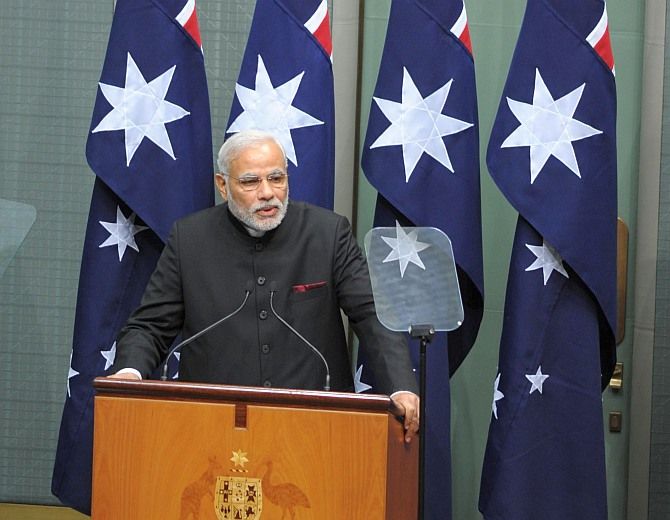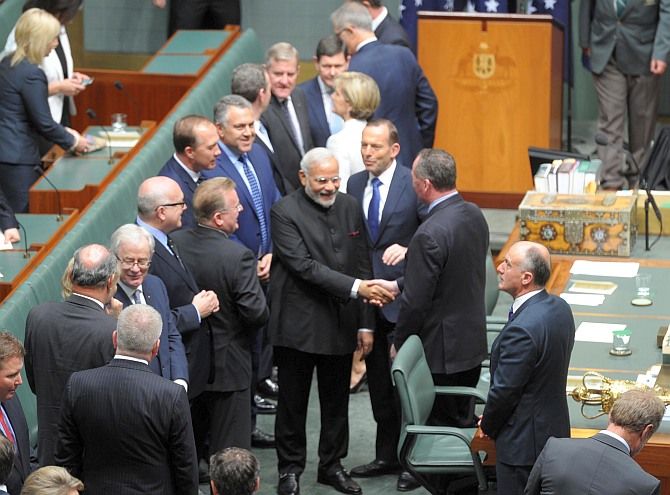Prime Minister Narendra Modi on Tuesday said Australia will not be at the periphery of India's vision but at the centre of its thought, as he called for closer bilateral security cooperation and a comprehensive global strategy to tackle the menace of terrorism.
Modi, while addressing the Australian Parliament, the first Indian prime minister to do so, said, "It has taken a Prime Minister of India 28 years to come to Australia. It should never have been so. And, this will change. Australia will not be at the periphery of our vision, but at the centre of our thought."
Modi addressed the Parliament after holding bilateral talks with Prime Minister Tony Abbott following which the two countries signed five pacts on social security, transfer of sentenced prisoners, combating narcotics trade, tourism, and arts and culture.
During the talks, the two sides sought an early conclusion of negotiations for a comprehensive economic partnership agreement and a closure on the civil nuclear deal.
Addressing the Parliament, Modi said terrorism has become a major threat.
"In India, we have seen its face closely for three decades. And, we see it with the clarity that comes with it. Terrorism is changing in character and expanding in its reach," Modi said.
"Internet has made recruitment and call to violence self-generated. It also feeds off money laundering, drug trafficking and arms smuggling. We have to deepen our bilateral security cooperation. But, we need a comprehensive global strategy for a global problem," he said.
In order to tackle the new security challenges, Modi sought closer security cooperation, a policy of no distinction between terrorist groups or discrimination between nations, a resolve to isolate those who harbour terrorists, willingness to empower states that will fight them, a social movement against extremism in countries where it is most prevalent and every effort to delink religion and terrorism.
"India sees Australia as one of our foremost partners in the region. There are few countries in the world where we see so much synergy as we do in Australia," Modi said.
The prime minister also called for support for the process of economic integration across the region and an open global trading system that remains integrated.
"We must guard against regional trade initiatives becoming instruments of political competition. However, economic integration by itself won't be a strong basis for peace and stability, without strong regional institutions," Modi said.
Modi also called for collaboration in the field of maritime security.
"We should collaborate more on maintaining maritime security. We should work together on the seas and collaborate in international forums. And, we should work for a universal respect for international law and global norms," he said.
Modi said countries needed to ensure that outer space and cyber space remain instruments of connectivity and prosperity, not new frontiers of conflict.
More importantly, he said, both the countries can work together to deal with piracy and range of other issues related to security.
"The oceans are our lifelines. But, we worry about its access and security in our part of the world more than ever before," he said.
"Responding to the region's disasters, combating proliferation, acting against piracy, we can work together on a full range of security challenges," the prime minister said.
Modi said India and Australia were members of several institutions "critical" to the region and the world and both the countries should coordinate more closely on different global fora.
He said the two countries need not have to rely on borrowed architecture of the past nor did the two have the luxury to "choose who we work with and who we don't."
"But, what we do need is to work together and with others to create environment and culture that promotes the currency of co-existence and cooperation; in which all nations, small and big, abide by international law and norms, even when they have bitter disputes.
"India and Australia are members of several institutions that are critical for this region and the world. We should coordinate more closely in East Asia Summit, G20 and the Indian Ocean Region Association," Modi said.
Modi said, India's development and growth provides a long term opportunity for Australia and it has immense opportunities in the field of agriculture, food processing,
mining, infrastructure, finance, technology and energy.
"We have a new Mission for turning 'Make in India' into a global name just as Computer in India is. But, we want to find new pathways to prosperity, not simply travel down the roads of the previous century. Much of India's future cities and infrastructure is yet to be built and so we have a unique opportunity to make our choices now.
"India's development, demography and demand provide a unique long term opportunity for Australia -- and all in the familiar framework of democracy. There is no other example of this nature in the world. Indian investors, too, are coming here in growing numbers and commitments," Modi said.
He highlighted that since his government came to office, no region has seen more intense engagement on India's part than Asia Pacific region.
Modi said Australia has immense opportunities to participate in India's progress and in turn, India will be the answer to Australia's search for new economic opportunities and desire to diversify global economic engagement.
He said India and Australia were connected to each other with history and geography.
Modi once again highlighted the example of Walter Griffin, who designed Canberra and was buried in Lucknow, after narrating his story to Abbott and Obama during the G20.
Modi, during his address, also talked about Australian novelist and lawyer Jang Lang, who helped Rani Laxmibai against the Birtish East India Company.
"This morning, Prime Minister and I honoured our soldiers, who 100 years ago made the supreme sacrifice together in the battle of Gallipoli. The man who designed this beautiful capital of Canberra, Walter Burley Griffin, lies buried in the old city of Lucknow in India.
"More than 150 years ago, an Australian novelist and lawyer John Lang fought the legal battle for a brave Indian freedom fighter, the Queen of Jhansi, Rani Laxmibai against the British East India Company in India's first War of Independence. He also lies buried in the Indian hill town of Mussoorie," Modi said.
He said both the nations had common love for cricket and are set to battle it out on the cricket field next month.
"We celebrate the legend of Bradman and the class of Tendulkar together. We are impressed by Australian speed as you are charmed by the Indian spin, until of course Shane Warne came along!" the Prime Minister said amidst laughter in the Parliament.
Speaking about his clear cut majority government in 30 years, the Prime Minister said there was a new "high tide" of hope and energy in India.
"Today, we have a government with a majority after thirty years. From the remotest village to the biggest cities, there is a new high tide of hope in India; a new energy. It is the energy of our youth -- the 800 million people below the age of 35 -- eager for change, willing to work for it -- because, now they believe that it is possible. That they can make it happen. It is this force of transformation that we will unleash.
"In the six months that we have been in office, we have moved forward, thinking with ambition, acting with speed; seeking growth not just for growth, but to transform the quality of life of every Indian," Modi said.
Lauding the people of Australia for making what the nation is today, Modi said generations of people's representatives have made the country one of the greatest nations of the world.
Prime Minister Modi also wished Australia the best for hosting a "great and successful" World Cup Cricket tournament early next year.
Abbott, who spoke in the Parliament ahead of Modi's address, said, if all went well, Australia will export uranium to India under suitable safeguards.
"I will make this declaration here in this parliament that there are two Prime Ministers in this chamber today and we will make it happen.
"If all goes well, Australia will export uranium to India under suitable safeguards because cleaner energy is one of the most important contributions that Australia can make to wider world. We want to be dependable source of energy, security of food and of security of India," Abbott said in his address.
"If all goes to plan an Indian company will begin Australia's largest ever coal development which will light the lives of hundred and million Indians for the next of half century," he said.
The Australian prime minister said that a new free trade agreement between the two countries is also on cards.
"If all goes to plan, and no one, if I may say so, has made the Indian bureaucracy perform as Prime Minister Modi did it in Gujarat, by the end of next year, we will have a free trade deal with what is potentially the world's largest market," he said.
Highlighting the growing economic and military prowess of India, Abbott lamented the fact that the business between India and Australia was only limited to $15 billion.
"Australia welcomes India's strength in the Indian Ocean. Australia admires Prime Minister Modi's invitation to come Make in India which echoes our own determination that Australia will be open for business but despite that regrettably Australia only did $15 billion business with India last year and that hardly does justice to our two countries' potential," Abbott said.
"Although India's GDP per person is still only about half of China, its growth is strong and economic prospects are broad and population is likely to overtake China's in couple of decades. This is why people now speak of the Indo-Pacific. It is now the focus of the world economic dynamism. With China, India is the rising superpower of Asia -- the emerging superpower that is already a democracy," he said.
With Modi becoming the first Indian prime minister to address the Australian Parliament, Abbott said it was long due that a leader of world's largest democracy addressed the House.
Praising Modi for his electoral victory in May this year, Abbott said there was a lot to learn from Modi and his working style and how he got the bureaucracy got going.
Image: Prime Minister Narendra Modi addresses the Joint Session of Parliament of Australia on November 18, 2014.
Photograph: M Asokan/Photo Division











 © 2025
© 2025